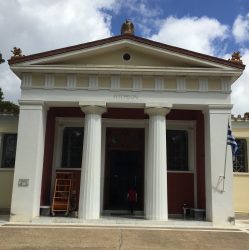In my previous blog post, I talked about my preparation for an interview I would be conducting with a local St. Mary’s county librarian. Since having the interview and taking the time to reflect on the responses of the interviewee, I believe that my questions were too spread out and had little focus as to the kind of censorship’s that the library has faced.
The interview itself I felt went excellent, we met at the desired location on time and had excellent, clear footage for the interview. The equipment functioned perfectly, no technical difficulties or problems operating the DSLR camera or the audio recorder. The next step will be to transcribe the interview so I will be able to refer to what was discussed without going through the entire video.
With the equipment in place the rest of the interview went as I had expected it to, the questions about censorship were responded to in a broad way that will allow the references to our novel to be used on our website. The interviewee seemed to be ready for the questions asked, she was not caught off guard about the topic and was well spoken in her opposition to censorship. They believed that the role of a librarian, and to a greater extent an educator, is to foster a place of learning where multiple and diverse opinions can be heard.
I think it is important for multiple opinions to be heard on issues concerning politics, race, and class; but often times people shut out differing opinions because they disagree or they offend others. It has come out that social media outlets, like Facebook, personalize and tailor your news feeds to match your personality and interests. But one unintended consequence of this has become a selection of political coverage that only shows you things you believe or have a tendency to lean towards. This kind of exclusion of opinions can lead to radicalization, improper facts, and closed mindedness. For more information on the topic refer to the article hyperlink below:
https://www.theguardian.com/technology/2014/jun/30/facebook-news-feed-filters-emotion-study
This interview has helped me to craft the questions for my next interview. In the next coming weeks, I will be meeting with a College professor at St. Mary’s College of Maryland. Professor Robin Bates was around at the time Song of Solomon and even wrote newspaper articles about the censorship. When I have my interview with Professor Bates, I plan to uncover what residents in St. Mary’s county thought about the book becoming banned, and if he knows anything more about the book itself. When we scheduled the meeting with Professor Bates, he informed my partner and I that he actually taught the High school that put Toni Morrison’s book on the reading list, which would later become the center of controversy.
Overall I was happy with the interview with the local librarian, and I look forward to the next interviews to uncover more of the secrets around the book becoming banned.

